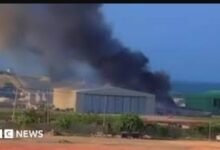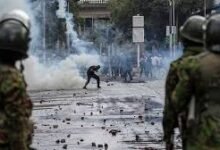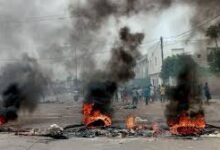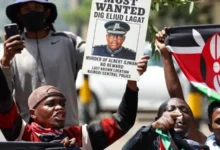Shots fired as Nigeria cracks down on hunger protests

Nigerian police have fired live bullets and tear gas to try and disperse thousands of protesters in the northern city of Kano rallying against the rising cost of living.
Many businesses across the country have closed as demonstrators in major cities chant slogans such as: “We are hungry.”
In Kano, which has seen the largest crowds so far, the gunshots were fired after protesters set alight tyres to make a bonfire in front of the state governor’s house. Four wounded people have been taken to hospital.
The protests have been organised via social media and inspired by the recent success protesters in Kenya who forced the government to scrap plans to increase taxes.
Officers have also sprayed hot water on the crowds in Kano, but they remain on the streets.
Looters have also broken into a warehouse near the governor’s house and people have been seen carrying away 25-litre cartons of vegetable cooking oil and mattresses.
On Wednesday night, a court ordered that protesters in the capital, Abuja, to keep to the National stadium, which is located on the city’s outskirts.
But after gathering at the stadium’s gate on Thursday morning, the demonstrators – who have also been shouting the refrain “End bad governance” – began heading into the city centre.
This prompted police to fire tear-gas cannisters to try and stop the procession, which is affecting traffic.
The security forces are deployed at strategic locations within the capital, where even banks are closed, and in surrounding towns.
In Lagos, Nigeria’s economic hub, the protest is slowly growing in strength.
Demonstrators are making their way to the area of Ojota, where the government said the protesters could gather, and have been shouting “ole”, meaning “thief” in the Yoruba language – in reference to President Bola Tinubu and his government.
Many are angered by President Tinubu’s removal of a subsidy on fuel – announced with immediate effect during his inauguration speech in May 2023.
It was aimed at cutting government expenditure, but sent pump prices soaring with a ripple effect on other goods.
“Top on our demand is the subsidy removal. The government should reverse that decision,” Abuja protester Abiodun Sanusi told the BBC.
They also want the government to carry out wide-ranging reforms to the country’s electoral system and the judiciary.
Before this so-called “day of rage”, the government appealed to Nigerians not to take to the streets and give the president time for policies to bear fruit. —BBC






